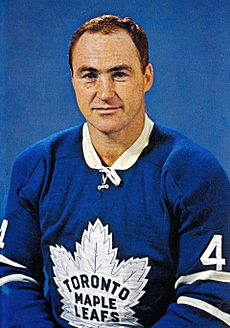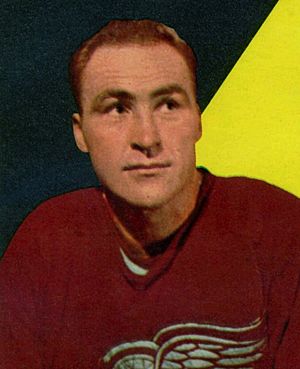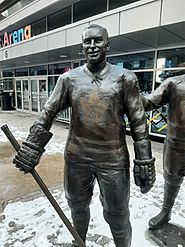Red Kelly facts for kids
Quick facts for kids Red KellyCM |
|||
|---|---|---|---|
| Hockey Hall of Fame, 1969 | |||

Kelly with the Toronto Maple Leafs in the 1960s
|
|||
| Born | July 9, 1927 Simcoe, Ontario, Canada |
||
| Died | May 2, 2019 (aged 91) Toronto, Ontario, Canada |
||
| Height | 6 ft 0 in (183 cm) | ||
| Weight | 195 lb (88 kg; 13 st 13 lb) | ||
| Position | Defence (1947–1960) Centre (1960–1967) |
||
| Shot | Left | ||
| Played for | Detroit Red Wings Toronto Maple Leafs |
||
| Playing career | 1947–1967 | ||
Leonard Patrick "Red" Kelly (July 9, 1927 – May 2, 2019) was a famous Canadian ice hockey player and coach. He was also a politician, serving as a Member of Parliament for the Liberal Party from 1962 to 1965. During this time, he even won the Stanley Cup twice while playing for the Toronto Maple Leafs.
Red Kelly won the Stanley Cup eight times, more than any other player who didn't play for the Montreal Canadiens. He was also the only player not from the Canadiens to be part of two of the nine "dynasties" (periods of great success) in National Hockey League (NHL) history. In 2017, he was named one of the '100 Greatest NHL Players' of all time.
Contents
Early Hockey Days
Red Kelly went to school in Port Dover and then to St. Michael's College School. He loved listening to hockey games on the radio, especially the Toronto Maple Leafs. He admired their tough defenceman, Red Horner. When Kelly played junior hockey for the St. Michael's Majors, his coach, Joe Primeau, helped him improve his playing style.
Playing in the NHL
The Maple Leafs decided not to sign Kelly, so he joined the Detroit Red Wings in 1947 when he was 19. In 1954, he was almost named the NHL's most valuable player. He won the James Norris Memorial Trophy as the best defenceman in the NHL, which was the first time this award was given out. He also won the Lady Byng Trophy three times (1951, 1953, and 1954) for being the most gentlemanly player in the league.
During his 12 years with the Red Wings, his team won eight regular-season championships and four Stanley Cups. He was chosen as one of the best defencemen in the league six times.
In 1960, Kelly was traded to the Toronto Maple Leafs. The coach, Punch Imlach, asked him to change from playing defence to playing centre. This change worked out very well. Kelly was already a great player, and he helped his teammate Frank Mahovlich become one of the best goal scorers ever.
Kelly won his fourth Lady Byng Award in 1961. In his eight seasons with the Leafs, they won four more Stanley Cups. This meant he won the same number of Cups with the Leafs as he did with the Red Wings. In his career, he played 1,316 regular season games, scoring 281 goals and 542 assists. When he retired, he was one of the top players in NHL history for points and assists.
Coaching Hockey Teams
After the Maple Leafs won the Stanley Cup in 1967, Kelly decided to stop playing. He became the first coach for the new Los Angeles Kings team. He led the Kings to the playoffs two years in a row.
In 1969, he left the Kings to coach the Pittsburgh Penguins. In his first year, the Penguins made it to the semifinals of the playoffs for the first time ever. He also became the team's general manager. Kelly later returned to the Maple Leafs as their coach in 1973. His teams made the playoffs every year he coached them, but they were always eliminated in the quarterfinals.
During the 1975–76 playoffs, Kelly tried something unusual. He used "pyramid power" to help his team. He hung a plastic pyramid in the team's locker room. Players, like captain Darryl Sittler, would stand under it. The Maple Leafs won all their home games in that series, but they eventually lost the series. Kelly was fired at the end of the 1976–77 season, ending his 30 years of continuous involvement in the NHL.
A Career in Politics
Kelly was elected to the House of Commons of Canada in 1962. He represented the York West area of Toronto for the Liberal Party of Canada. He won again in the 1963 election. What's amazing is that Kelly continued to play for the Toronto Maple Leafs while he was a Member of Parliament!
During a big debate about changing Canada's flag, Kelly faced opposition from the Leafs' owner, Conn Smythe, who didn't want to change the flag. Kelly decided not to run for re-election in 1965. He left politics because he wanted to spend more time with his family.
Achievements and Honors
Red Kelly achieved many great things in his career:
- He was named a First Team All-Star defenceman six times.
- He was named a Second Team All-Star defenceman twice.
- His name is on the Stanley Cup eight times: four with Detroit (1950, 1952, 1954, 1955) and four with Toronto (1962, 1963, 1964, 1967).
- He was elected to the Hockey Hall of Fame in 1969.
- In 1998, he was ranked number 22 on The Hockey News' list of the 100 greatest hockey players.
- In 2001, he was made a Member of the Order of Canada, a high honor for Canadians.
- He was inducted into the Ontario Sports Hall of Fame in 2001.
- The Toronto Maple Leafs retired his jersey number 4 on October 15, 2016.
- In 2016, he published his autobiography, "The Red Kelly Story."
- In 2017, he was named one of the 100 Greatest NHL Players in history.
- The Detroit Red Wings also retired his jersey number 4 on February 1, 2019.
Personal Life
Red Kelly married Andra Carol McLaughlin, an American figure skater, in 1959. They had four children. His son, Leonard Patrick Kelly Jr., competed for Canada in speed skating at the Olympics. Two of his grandsons, George and Bruce Waddell, are also ice dancers. Red Kelly passed away on May 2, 2019, at the age of 91.
Career statistics
| Regular season | Playoffs | |||||||||||||
|---|---|---|---|---|---|---|---|---|---|---|---|---|---|---|
| Season | Team | League | GP | G | A | Pts | PIM | GP | G | A | Pts | PIM | ||
| 1943–44 | St. Michael's Midgets | Minor-ON | 8 | 10 | 5 | 15 | — | — | — | — | — | — | ||
| 1944–45 | St. Michael's Buzzers | Big-10 Jr. B | 11 | 15 | 13 | 28 | 7 | 11 | 16 | 8 | 24 | 6 | ||
| 1944–45 | St. Michael's College Majors | OHA-Jr. | 1 | 0 | 0 | 0 | 0 | — | — | — | — | — | ||
| 1945–46 | St. Michael's College Majors | OHA-Jr. | 26 | 13 | 11 | 24 | 18 | 11 | 1 | 0 | 1 | 7 | ||
| 1946–47 | St. Michael's College Majors | OHA-Jr. | 30 | 8 | 24 | 32 | 11 | 9 | 3 | 3 | 6 | 9 | ||
| 1946–47 | St. Michael's College Majors | M-Cup | — | — | — | — | — | 9 | 5 | 5 | 10 | 2 | ||
| 1947–48 | Detroit Red Wings | NHL | 60 | 6 | 14 | 20 | 13 | 10 | 3 | 2 | 5 | 2 | ||
| 1948–49 | Detroit Red Wings | NHL | 59 | 5 | 11 | 16 | 10 | 11 | 1 | 1 | 2 | 6 | ||
| 1949–50* | Detroit Red Wings | NHL | 70 | 15 | 25 | 40 | 9 | 14 | 1 | 3 | 4 | 2 | ||
| 1950–51 | Detroit Red Wings | NHL | 70 | 17 | 37 | 54 | 24 | 6 | 0 | 1 | 1 | 0 | ||
| 1951–52* | Detroit Red Wings | NHL | 67 | 16 | 31 | 47 | 16 | 5 | 1 | 0 | 1 | 0 | ||
| 1952–53 | Detroit Red Wings | NHL | 70 | 19 | 27 | 46 | 8 | 6 | 0 | 4 | 4 | 0 | ||
| 1953–54* | Detroit Red Wings | NHL | 62 | 16 | 33 | 49 | 18 | 12 | 5 | 1 | 6 | 4 | ||
| 1954–55* | Detroit Red Wings | NHL | 70 | 15 | 30 | 45 | 28 | 11 | 2 | 4 | 6 | 17 | ||
| 1955–56 | Detroit Red Wings | NHL | 70 | 16 | 34 | 50 | 39 | 10 | 2 | 4 | 6 | 2 | ||
| 1956–57 | Detroit Red Wings | NHL | 70 | 10 | 25 | 35 | 18 | 5 | 1 | 0 | 1 | 0 | ||
| 1957–58 | Detroit Red Wings | NHL | 61 | 13 | 18 | 31 | 26 | 4 | 0 | 1 | 1 | 2 | ||
| 1958–59 | Detroit Red Wings | NHL | 67 | 8 | 13 | 21 | 34 | — | — | — | — | — | ||
| 1959–60 | Detroit Red Wings | NHL | 50 | 6 | 12 | 18 | 10 | — | — | — | — | — | ||
| 1959–60 | Toronto Maple Leafs | NHL | 18 | 6 | 5 | 11 | 8 | 10 | 3 | 8 | 11 | 2 | ||
| 1960–61 | Toronto Maple Leafs | NHL | 64 | 20 | 50 | 70 | 12 | 2 | 1 | 0 | 1 | 0 | ||
| 1961–62* | Toronto Maple Leafs | NHL | 58 | 22 | 27 | 49 | 6 | 12 | 4 | 6 | 10 | 0 | ||
| 1962–63* | Toronto Maple Leafs | NHL | 66 | 20 | 40 | 60 | 8 | 10 | 2 | 6 | 8 | 6 | ||
| 1963–64* | Toronto Maple Leafs | NHL | 70 | 11 | 34 | 45 | 16 | 14 | 4 | 9 | 13 | 4 | ||
| 1964–65 | Toronto Maple Leafs | NHL | 70 | 18 | 28 | 46 | 8 | 6 | 3 | 2 | 5 | 2 | ||
| 1965–66 | Toronto Maple Leafs | NHL | 63 | 8 | 24 | 32 | 12 | 4 | 0 | 2 | 2 | 0 | ||
| 1966–67* | Toronto Maple Leafs | NHL | 61 | 14 | 24 | 38 | 4 | 12 | 0 | 5 | 5 | 2 | ||
| NHL totals | 1,316 | 281 | 542 | 823 | 327 | 164 | 33 | 59 | 92 | 51 | ||||
* Stanley Cup Champion.
Coaching record
| Team | Year | Regular season | Post season | |||||
|---|---|---|---|---|---|---|---|---|
| G | W | L | T | Pts | Finish | Result | ||
| LA | 1967–68 | 74 | 31 | 33 | 10 | 72 | 2nd in West | Lost in quarter-finals (3-4 vs. MIN) |
| LA | 1968–69 | 76 | 24 | 42 | 10 | 58 | 4th in West | Won in quarter-finals (4-3 vs. OAK) Lost in semi-finals (0-4 vs. STL) |
| PIT | 1969–70 | 76 | 26 | 38 | 12 | 64 | 2nd in West | Won in quarter-finals (4-0 vs. OAK) Lost in semi-finals (2-4 vs. STL) |
| PIT | 1970–71 | 78 | 21 | 37 | 20 | 62 | 6th in West | Did not qualify |
| PIT | 1971–72 | 78 | 26 | 38 | 14 | 66 | 4th in West | Lost in quarter-finals (0-4 vs. CHI) |
| PIT | 1972–73 | 42 | 17 | 19 | 6 | (73) | 5th in West | (fired) |
| TOR | 1973–74 | 78 | 35 | 27 | 16 | 86 | 4th in East | Lost in quarter-finals (0-4 vs. BOS) |
| TOR | 1974–75 | 80 | 31 | 33 | 16 | 78 | 3rd in Adams | Won in preliminary round (2-1 vs. LA) Lost in quarter-finals (0-4 vs. PHI) |
| TOR | 1975–76 | 80 | 34 | 31 | 15 | 83 | 3rd in Adams | Won in preliminary round (2-1 vs. PIT) Lost in quarter-finals (3-4 vs. PHI) |
| TOR | 1976–77 | 80 | 33 | 32 | 15 | 81 | 3rd in Adams | Won in preliminary round (2-1 vs. PIT) Lost in quarter-finals (2-4 vs. PHI) |
| LA Total | 150 | 55 | 75 | 20 | 130 | 7-11 (0.389) | ||
| PIT Total | 274 | 90 | 132 | 52 | 232 | 6-8 (0.429) | ||
| TOR Total | 318 | 133 | 123 | 62 | 328 | 11-19 (0.367) | ||
| Total | 742 | 278 | 330 | 134 | 690 | 24-38 (0.388) | ||
See also
- Captain (hockey)
- List of NHL players with 1000 games played
 | Tommie Smith |
 | Simone Manuel |
 | Shani Davis |
 | Simone Biles |
 | Alice Coachman |



